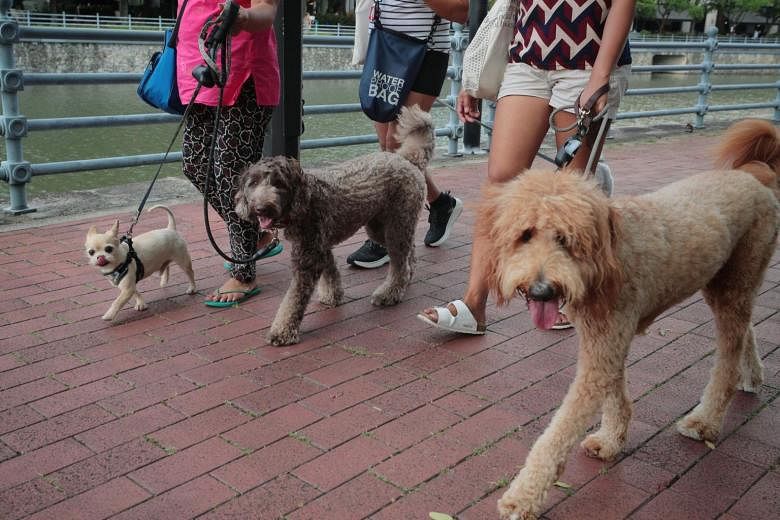SINGAPORE - Sweeping changes to licensing conditions for pet boarders and breeders in Singapore were announced on Friday (Oct 8), in a move by the National Parks Board's Animal and Veterinary Service (AVS) to boost animal welfare here.
From April 1 next year, those who breed pets for sale will need to do daily health checks for breeding pets and their litters.
They must also provide their animals with opportunities for social interaction, exercise and enrichment, and maintain documentary proof of vaccinations, annual health checks, veterinary treatment or surgical procedures.
Breeding dogs can be used to produce only a maximum of one litter every year, and they must be retired when they turn six. In-breeding is also not allowed.
The dogs must be sterilised within six months of retirement, and licensees will need to ensure there is post-retirement care for retired breeding pets, either in continuing to care for them on the farm or rehoming them, said AVS on Friday.
Under the enhanced licensing conditions, breeders must also maintain a record of dogs that have died on the premises, including their age, date and cause of death.
For dogs above 21 days in age, the farm must issue a death certificate which should be kept at the premises for at least one year from the date the death is registered, for AVS' inspection. The probable, presumed or determined cause of death, where applicable, must be clearly stated on all death certificates issued, AVS said.
As for pet boarders, large changes have been made to licensing requirements.
Previously, only boarders who had operations on farmlands had to be licensed. As a result of this regulation, only five boarders were licensed.
Now, any boarder that operates commercially has to be licensed.
According to NParks, there are approximately 50 commercial boarders that now need to be licensed for legal operations.
Changes have been made to operational standards as well.
Boarders can accept only vaccinated animals which are healthy, and must provide sufficient space for animals at their facility.
AVS said it will also require all staff who are responsible for the day-to-day running of the premises and care of animals to undergo training to ensure they are suitably equipped to handle the boarded animals.
"For accountability of the boarding facility, staff are required to immediately report to AVS and inform the pet owner, should there be any incident of serious injury or death within the boarding facility. Records of such incidents must also be maintained," AVS added.
These changes to licensing conditions for the pet boarding and breeding sector follows more than two years of public consultation with industry players and comes in the aftermath of several high-profile cases involving pets that died at the hands of boarding facilities here.
On case was the death of Prince, a shetland sheepdog who was boarded at Platinium Dogs Club in January 2019. His owner could not establish the cause of his death, as he was simply cremated after he died in the boarding facility.

In 2019, Garfield, a one-year-old maltese, died after swimming at Tanjong Beach on Sentosa with 16 other dogs while under the care of seven handlers from pet boarding and daycare company Board N' Play.
AVS said that not abiding by the conditions will constitute a breach of licensing conditions, which can get breeding licences revoked.
The latest move by AVS to tighten restrictions on pet businesses here to improve animal welfare comes amid a growing number of pet shops and businesses in Singapore.
In 2018, there were 68,000 dog licenses and 251 pet shops. Last year, the number went up to 72,000 dog licenses and 300 pet shops.
While animal welfare and regulation of pet businesses used to fall under the purview of the then Agri-Food and Veterinary Authority, NParks took over this role on April 1, 2019.
Later that year in August, NParks embarked on a review of the pet sector to raise the standards of animal health and welfare.
Almost 6,000 responses were received from five focus group discussions, two public online surveys and nine sessions of industry engagement.

Mr Tan Kiat How, Minister of State for National Development, said during a press briefing on Friday morning that there was consensus that more needs to be done to raise the standards of pet breeders and boarders, and this was identified as a key priority area for review.
He also said that NParks is also working with veterinarians, dog trainers and animal welfare groups to improve the processes for rehoming, adoption and rehabilitation of dogs.
Mr Tan added: "Safeguarding animal health and welfare is a shared responsibility, and we will continue to work together with all our stakeholders to raise the overall standards in the pet sector."
Mr Colin Heng from Canine Association, a coalition of licensed dog breeders in Singapore, said that most of the regulations announced on Friday were not new them, as the industry had been involved in the consultation process.
He said: "Breeders are happy to embark on this - everyone is on board and very happy with this arrangement."
He also said that the six months grace period before the tightened licensing conditions should be easily met by industry participants, even large-scale operators.
He added that AVS had involved the industry during the consultations at every step of the way, and that he was happy with the process. Most of the higher standards were suggested by dog breeders themselves, he noted.
Mr Louis Ng, an MP for Nee Soon GRC who has spoken up about the animal welfare sector in Parliament on numerous occasions, welcomed the improvement in licensing conditions.
His dog, Penni, was from a puppy mill, he said, referring to businesses that churn out puppies for sale in often inhumane conditions.
"Puppy mills have been a long-drawn issue that many animal welfare groups have been working for years on, and I'm very glad that the changes have been made. At least, they have time out of their cages, they get to retire, and all these changes are very welcome."
Mr Ng, who founded wildlife rescue group Animal Concerns Research and Education Society and is a known animal welfare advocate, said breeding animals used to be euthanised when they were retired.
He added: "With these new licensing conditions, they need to report why the animals die. So now a puppy mill can't kill a dog for no reason. That measure alone will be a good assurance."
Boosting animal welfare
From April 1 next year, pet breeders and pet boarders in Singapore must meet improved licensing conditions or have their licences revoked. These new conditions will improve animal welfare in Singapore. Here are some key changes.
Pet breeding industry
Current conditions
• Certain dogs, such as female dogs that have undergone two caesareans, or are under 12 months or above six years old cannot be used for breeding.
• There is no limit on the number of litters per dog. No post-retirement care plans need to be made.
• There must be secure areas for the dogs to exercise.
• Records of breeding animals must be kept for checks by Animal and Veterinary Service (AVS) officers every year.
New conditions
• On top of previous conditions, breeders must also ensure that dogs are not in-bred. Each dog can breed only one litter a year.
• Retired breeding dogs must be sterilised and post-retirement care must be ensured.
• Breeders must also ensure animals have opportunities for social interactions, like being allowed to go on walks.
• Mandatory records now include more details including animal movement, litter records and veterinary treatments.
Pet boarding industry
Current conditions
• Licensing is not compulsory for pet boarders.
• Sick animals are allowed to be boarded.
• No daily health checks are mandated.
• No training is necessary for staff at boarding houses.
• Deaths and injuries within the boarding house do not need to be reported to any authority.
New conditions
• All pet boarders that have a commercial operation must be licensed.
• Sick animals with transmissible diseases cannot be boarded.
• Daily health checks now mandatory.
• Staff must undergo mandatory training and refresher courses.
• Serious injury or death of any animal must be reported to AVS.


